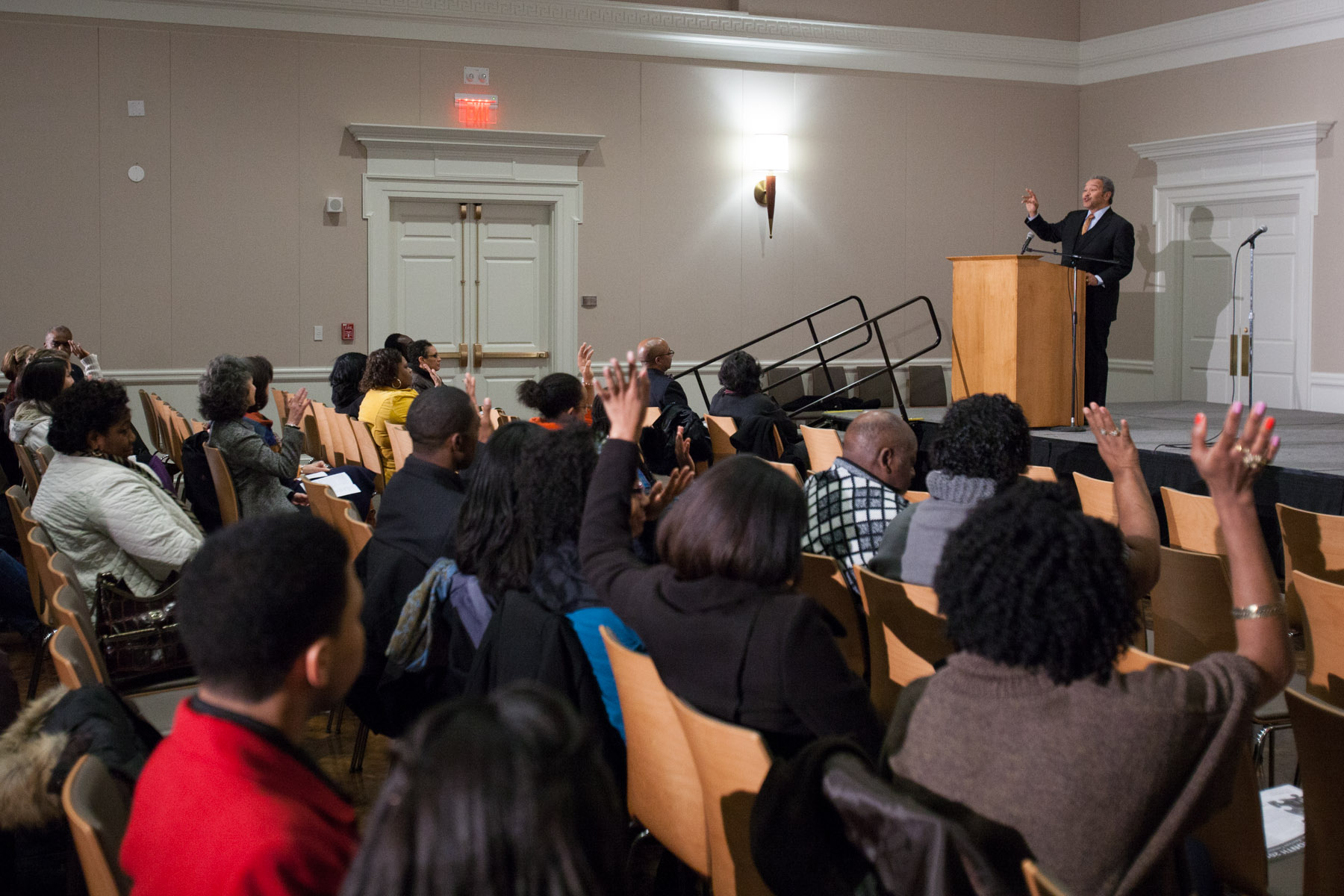The Rev. Dr. Martin Luther King Jr.’s birthday can serve as an annual “moral checkpoint” for Americans to reflect on how the country and its people are doing in terms of King’s legacy of service and leadership for social justice, said Robert M. Franklin Jr., the keynote speaker in the University of Virginia’s monthlong celebration of the slain civil rights leader.
Franklin, the visiting scholar in residence at Stanford University’s Martin Luther King Jr. Research and Education Institute, spoke Thursday evening to a crowd of about 100 people in Newcomb Hall Ballroom.
Franklin has written several books considering King’s work and wrote the foreword to his “Letter from Birmingham Jail,” reprinted by Trinity Forum last year. At the institute, he has access to King’s library and the bulk of his papers.
Franklin described King as “a Renaissance man” and compared his education and lifelong learning to the purpose of a university such as U.Va. – cultivating Renaissance men and women.
Like King, Franklin attended Atlanta’s Morehouse College and became an ordained minister. Franklin went on to serve as president of Morehouse from 2007 to 2012.
He talked about the aspects of King’s life that made him “a Renaissance man with a social conscience and a global perspective.” King serves as a model to which everyone should aspire: to be well-read, well-spoken, well-traveled and well-balanced, Franklin said.
The variety of titles in King’s library, from religion to economics to sociology, show the broad liberal learning that he continued throughout his life, Franklin said. The power of King’s capacity to put words together came not only from studying classical oratory, but also absorbing the oral traditions of African-American culture.
King and his wife, Coretta, traveled to Ghana in 1957 and were there when the country was establishing its independence. Franklin urged the audience, especially the students, to make traveling a goal, sooner rather than later.
By “well-balanced,” Franklin said he meant “a healthy mind and body governed by healthy values.”
When Franklin said the King holiday should be regarded as a moral checkpoint, he used the analogy of travelers at a border checkpoint, where they must pause and undergo an inspection before proceeding. Part of King’s legacy comes from his growing emphasis on the “inescapable network of destiny,” Franklin said.
He quoted words from King’s last book , “Where Do We Go From Here: Chaos or Community?” that “all people are interdependent whether we realize it or not ... we are everlasting debtors to unknown men and women.”
“What are you doing? How are we doing?” Franklin asked, adding that every year elders and experts should get together, review the state of the community and social justice, and develop activities to improve it.
“One area I think King would address is America’s love affair with guns,” he said, citing a recent New York Times article about youth living in a free-fire zone. King would note that in the U.S. prison system, the largest in the world, most of the young men are high-school dropouts, and that thousands of dollars are spent on imprisoning them instead of on their education, Franklin said. He noted that in Virginia, barely 50 percent of African-American boys graduate from high school.
The situation offers an opportunity for people to work on rebuilding relationships and community, Franklin said.
He quoted a 1954 sermon of King’s, in which he wrote, “The saving of our world from pending doom will come, not through the complacent adjustment of the conforming majority, but through the creative maladjustment of a non-conforming minority.”
The event also featured performances from three choirs: U.Va.’s Black Voices Gospel Choir, the Black Awakening Gospel Choir from Virginia Commonwealth University and the Virginia State University Gospel Chorale.
The Community MLK Celebration, sponsored by U.Va.’s Office for Diversity and Equity and several other offices, schools and departments, plus community organizations, continues with more speakers, panel discussions and films through Feb. 8.
Media Contact
Article Information
January 25, 2013
/content/franklin-urges-audience-act-based-human-interdependence-king-did

